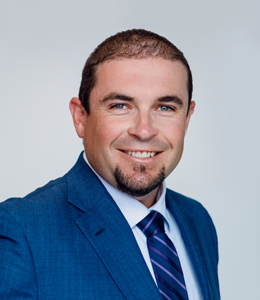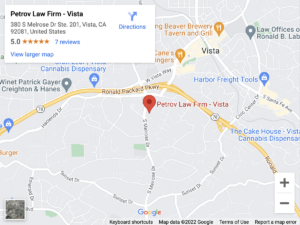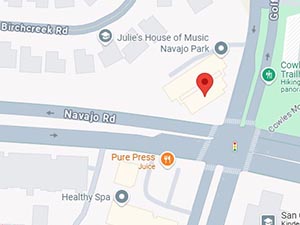
A brain injury can happen in almost any type of traumatic incident in Encinitas, CA. Brain damage can occur even when the victim does not suffer head trauma. Violating shaking, chemical exposure, and oxygen deprivation can damage the brain. Regardless of the cause, brain injuries can produce severe physical, cognitive, and emotional symptoms.
These effects might disable the victim from working or caring for their needs in Encinitas, California. The victim might even need a caretaker to help with basic activities like eating, dressing, and using the restroom.
An Encinitas brain injury lawyer at Petrov Personal Injury Lawyers can pursue compensation under California law. Contact our law office in Encinitas, CA at (619) 344-0360 to learn more about recovering damages for medical treatment, therapy, and other necessary services.
How Petrov Personal Injury Lawyers Can Help After You Suffer a Brain Injury In Encinitas, CA

Petrov Personal Injury Lawyers was founded in 2011 to assist injured clients in Encinitas, California, and the surrounding area fight for fair compensation. Our Encinitas brain injury lawyers have over 20 years of combined legal experience and have recovered over $40 million in compensation for clients.
After you suffer a brain injury due to someone else’s intentional or negligent actions, our Encinitas personal injury lawyers provide the following:
- A free case evaluation to discuss your rights and options
- Aggressive lawyers to file your insurance claim and negotiate for a fair settlement
- Experienced litigation if the at-fault party and insurer refuse to settle
Brain injuries can leave victims with permanent brain damage that affects them for the rest of their lives. Contact Petrov Personal Injury Lawyers to discuss the brain injury symptoms you or your loved one experienced and how you can pursue financial compensation.
How Many People Suffer Brain Injuries In California?
Brain injuries happen more often than most people realize. Sports and recreational activities alone cause up to 3 million concussions each year. Accidents cause millions more. Experts estimate that only half of the concussions get diagnosed by doctors and emergency rooms. These numbers only account for the mildest of brain injuries.
About 1.2 million patients over the age of 18 were diagnosed with traumatic brain injuries (TBIs) between 2005 and 2014 in California. In other words, California averaged roughly 120,000 adults per year with TBIs during the study period.
Importantly, these numbers only include TBIs caused by intentional or unintentional trauma to the brain.
Common Causes of Brain Injuries
According to the U.S. Centers for Disease Control, some of the most common causes of TBIs include the following:
Motor Vehicle Crashes
Car accidents, truck accidents, and motorcycle accidents are the leading causes of traumatic brain injuries. The forces involved in a crash can shake your brain. Even a minor collision can shake your brain hard enough to cause a concussion. A severe collision can shake the brain hard enough that it hits the inside of the skull.
You can suffer a brain injury even if you do not hit your head. When you collide with another vehicle, your brain keeps moving in the same direction and speed as before the collision. This whipping motion can damage your brain.
Falls
Both slip and fall accidents and elevated fall accidents can produce brain injuries. These injuries often happen when the head strikes the ground or other surface. The brain jerks toward the impact site, tearing soft tissues and bruising the brain. Falls are the leading cause of TBI-related death and hospitalizations in older Californians.
Falling or Moving Objects
One of the most common causes of construction site deaths happens when workers get struck by falling or moving objects. These objects can damage the brain when they hit your head. They can also cause brain injuries if they knock you over and you strike your head on the ground. These injuries can also happen in pedestrian accidents when a vehicle hits you.
Drowning and Asphyxiation
Your brain requires one-fifth of your body’s oxygen supply. If you cannot breathe for even a brief period, you could suffer permanent brain damage. These injuries can happen when you suffer severe blood loss. They can also happen in drowning accidents, fires, and accidental poisonings.
Assault
Assaults can produce brain injuries. A knife or gunshot wound to the head can destroy brain tissue. Blows to the head can rattle the brain. Violent shaking can tear brain cells, producing shaken baby syndrome or other brain injuries characteristic of domestic violence.
Drug Overdose
Drug overdoses and drug errors can damage brain cells. This brain damage can happen directly as the drugs interfere with the functioning of the brain cells. It can also happen indirectly when the victim loses consciousness and suffers oxygen deprivation.
Brain Injury Types
Brain injuries can take many different forms depending on the tissue damage. Some examples of brain injuries include the following:
Concussion
The mildest forms of brain injuries include concussions. These injuries happen when the brain gets rattled inside the skull. The meninges and cerebrospinal fluid stop the brain from hitting the inside of the skull. Pressure on the brain damages brain cells. The body responds to damage by triggering inflammation in the brain. As the brain swells, its functions become impaired.
Concussions rarely cause death. In most cases, the symptoms from these injuries last fewer than two months.
Cerebral Contusion
Cerebral contusions happen when the brain moves far enough to hit the inside of your skull. The impact ruptures some of the blood vessels inside the brain, producing a bruise. The bruised area swells. Some of the brain cells may die from the pressure produced by the swelling. They may also die from a lack of blood circulation.
Penetrating Injury
Penetrating injuries happen when an object tears into the brain tissue. The injury might result from a foreign object like a knife blade, bullet, or nail that pierces the skull. It might also happen if you fracture your skull and bone fragments penetrate the brain. The tearing severs connections between brain cells and prevents them from communicating with each other.
Anoxic Injury
Anoxic injuries happen when your brain does not get enough oxygen. The brain can suffer permanent brain damage after just four minutes of oxygen deprivation. Brain death occurs if oxygen is not restored within eight to ten minutes.
Subdural Hematoma
A subdural hematoma occurs when a blood vessel in your brain tears. The bleeding deprives your brain of oxygen. The resulting clot causes pressure to build inside your skull, compressing the brain and squeezing off blood vessels. Doctors can attempt to treat these injuries by removing a piece of skull to relieve the pressure.
Diffuse Axonal Injury (DAI)
Brain cells have a long axon between their ends. A back-and-forth whipping motion can tear these axons, resulting in a DAI. A torn axon prevents signals from traveling along the brain cell. This type of injury often causes permanent brain damage or death.
Symptoms of a Brain Injury
Your brain controls everything in your body, including your voluntary responses, like walking or smiling, and involuntary responses, like digestion and heart rate. It also receives sensory information and processes information to form thoughts and emotions. As a result, brain injuries can cause a range of symptoms, including the following:
Physical Symptoms
Physical symptoms can affect your muscles, organs, and senses. Some physical symptoms you may experience after a brain injury include:
- Pain
- Loss of sight, hearing, taste, or smell
- Slurred speech
- Tinnitus
- Blurry vision
- Muscle weakness and spasms
- Numbness
- Tingling
- Dizziness and nausea
- Loss of balance and coordination
- Loss of dexterity and fine motor skills
These physical symptoms may disable you from working. In some cases, your brain can use a property called neuroplasticity to rewire itself to regain lost functions. In other cases, you will suffer permanent physical disabilities.
Cognitive Symptoms
Since your brain is responsible for processing information, TBIs can cause cognitive symptoms such as:
- Confusion
- Amnesia
- Difficulty concentrating
- Difficulty solving problems
- Poor judgment
- Drowsiness
- Loss of consciousness
- Seizures
- Coma
As with physical functions, neuroplasticity can help you regain lost functions. You may need therapy to help you relearn the skills and knowledge you lost.
Emotional Symptoms
Emotional symptoms produce the least predictable effects. Some emotional symptoms that follow a brain injury include:
- Personality changes
- Depression
- Anxiety
- Paranoia
- Emotional outbursts
Emotional symptoms can lead to other effects like substance abuse. Therapy can sometimes relieve these symptoms.
Damages You Can Seek for a Brain Injury
You may incur significant losses due to the profound effects of your brain injury on your health and quality of life. You can seek compensation for both economic and non-economic losses, including the following:
- Medical costs
- Income losses
- Diminished earning capacity
- Therapy expenses
- Disability
- Physical pain
- Mental anguish
- Emotional distress
To recover compensation, you must prove the other party acted negligently or intentionally in causing your brain injury.
Call Our Encinitas Brain Injury Lawyers for a Free Consultation
A brain injury can cause permanent disabilities that prevent the victim from working or performing necessary tasks in Encinitas, CA. Contact Petrov Personal Injury Lawyers for a free consultation with our Encinitas brain injury attorney. Contact our law office in Encinitas, CA at (619) 344-0360. We are here to discuss the brain injury you or a loved one suffered and how you can seek financial compensation for it.


